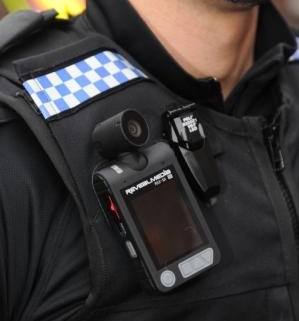
This in from the police, in their own words. Ed
The Isle of Wight has been chosen for a project to test how Body Worn Video (BWV) cameras, personally issued to frontline officers, could improve policing.
BWV devices are visible cameras attached to the chest of an officer or PCSO. They can record video and audio evidence for a policing purpose.
Used in parts of the Isle of Wight since 2008
They were first trialled by a UK police force in 2006 and 2007, and the technology has been used in parts of the Isle of Wight and Hampshire from 2008.
Hampshire Constabulary is exploring how an increase in the use of Body Worn Video (BWV) can provide a more efficient and accountable service to the public.
Personal issue project on the Isle of Wight
Officers on the Isle of Wight have asked to assess the effects of ‘personal issue’ BWV cameras for Hampshire Constabulary over the course of one year.
‘Personal issue’ means one camera is assigned to one specific officer or PCSO for the duration of the project, which will run from March 2013 to March 2014.
Hampshire Constabulary is working in partnership with ‘Reveal Media’ http://www.revealmedia.com/; an approved supplier of these cameras to the force since 2008.
‘Reveal Media’ is supplying approximately 180 body worn video cameras for individual officers and staff to carry on the Isle of Wight.
Aims of the project
Inspector Steve Goodier, who is leading the Body Worn Video project on the Isle of Wight said:
“The limited use of body worn video (BWV) in recent years has shown it has the ability to increase the quality of evidence and our ability to protect the community with a more effective criminal justice system.
“The force wants to put this potential to the test on a larger scale by training frontline officers and PCSOs to carry these cameras in their daily duties.
“We will only record with these cameras for a specific policing purpose when evidence needs to be captured swiftly at that moment.
“Body Worn Video is a reliable hi-tech witness that makes us more efficient and accountable to the public in many of the most challenging circumstances faced by police.”
For example:
- Video recordings can help put a crime or incident into context for those reviewing the evidence, particularly magistrates or a jury.
- When offenders are shown footage of their behaviour, this can often lead them to plead guilty at an early stage.
- An increase in guilty pleas can mean less time spent preparing court papers and attending court.
- Video recordings of domestic abuse incidents in particular can support a victim’s report, and give them confidence to testify and bring the offender to justice
- If people know their actions are being directly recorded by an officer to use as evidence, they often moderate their behaviour
Independent scrutiny and evaluation of the project
Police on the Isle of Wight are working with experienced independent researchers from University of Portsmouth’s Institute of Criminal Justice Studies, which can evaluate the project impartially.
Inspector Steve Goodier said: “I’m grateful for the commitment and expertise of the university researchers, who are looking at a number of ways to measure the effect of police using body worn video across the whole island each day.”
Some of these factors include the impact on:
- All recorded crime
- The time taken to bring prosecutions to court
- The amount of complaints against police and the time taken to resolve them
- The impact on public perception and confidence in policing
The start of the project involves a survey to gauge existing public awareness and opinions of BWV on the Isle of Wight before the personal issue project is announced.
A second public survey will be conducted at the end of the project in early 2014 to measure the effect on public awareness and opinions of BWV.
The outcome of the project
Inspector Steve Goodier said: “The results of the survey and an analysis of all these factors will influence decisions taken both locally and nationally about the future of body worn video by police forces.
“Ultimately the police force is striving to make the most of technology to reduce bureaucracy, cut crime, catch more criminals, and provide an excellent service in protecting the people we serve from harm.”
How will the public know they’re being recorded?
Under the Data Protection Act 1998, police forces have a duty to inform a person that their actions are being recorded on Body Worn Video for evidence in support of criminal prosecutions.
This can be done by the officer stating clearly when a recording starts, or it can be as simple as the camera being obviously visible to a person being recorded.
Communications, in the form of wider publicity to the media and public, is also recommended under national Home Office guidelines.
What happens to the footage recorded on BWV devices?
The BWV footage is stored securely using software specifically designed for police use. The footage is stored in line with guidance from the Home Office as well as legislation including the:
- Data Protection Act 1998
- Freedom of Information Act 2000
- Human Rights Act 1998
Footage that is used as evidence will be available to the defence and Crown Prosecution Service (CPS) in any criminal proceedings that take place. Non-evidential footage will be deleted after 31 days.
BWV devices are not a substitute for making pocket notebook entries.
The cost of the project
The budget for the whole Hampshire Constabulary project is £261,000.
The Isle of Wight personal issue project has been allocated funding of £47,500.


